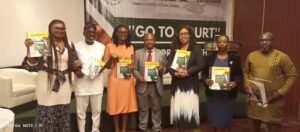The launch of Spaces for Change’s | S4C’s latest report, titled, “Go to Court: Synonym for Judicial Capture” on October 31, 2023, brought together stakeholders in Nigeria’s justice and electoral sectors such as the judiciary, the Nigerian Bar Association, the Independent National Electoral Commission (INEC), political parties, academia, civil society organizations, and the media, to appraise the impact of the judiciary on Nigeria’s electoral landscape.
One of the overarching trends observed during the 2023 general elections is that the courts, rather than the voters, played a decisive role in determining who gained or lost political power. For instance, a total of 1,225 election petitions were filed protesting the outcome of the general elections, marking a substantial 59.92% increase compared to the number of petitions in the 2019 elections. The report attributed this surge to electoral malpractices and the reluctance of the INEC to exercise its review powers, eroding public trust in the electoral process and necessitating increased judicial intervention during the 2023 elections. This contradicted pre-election expectations, which assumed that the infusion of technology, including the Bimodal Voter Accreditation System (BVAS) and the INEC Result Viewing Portal (IReV), would ensure credible elections with minimal human interference.
Another factor behind the high number of election-related court cases was the decline in internal democracy within political parties, especially in the conduct of ward congresses and candidate nomination processes. Gross violations of the Electoral Act and party constitutions excluded some individuals from the process or replaced them illegally after they had won primary elections. Other contributing factors include the need to protect religious freedoms, requests for voter registration extension, redressing wrongs associated with political exclusion, and demands for diaspora voting.
The way Nigerian courts handled these election-related disputes either expanded or repressed the civic space in many respects. In some instances, the courts contributed to opening civic space by progressively interpreting the constitution and electoral laws to safeguard freedom of expression, association, and assembly rights. In some cases, the courts actively avoided engaging in partisan politics, particularly when exercising discretionary powers, leading to increased civic participation and improved electoral jurisprudence. Conversely, the report also found that the courts narrowed civic space by prioritizing election cases, limiting access to justice, delivering “technical” and contradictory judgments, and promoting political exclusion and the repression of association rights.
Furthermore, the report highlighted broader civic space issues during the 2023 general election. It revealed that the freedom of association was the most dominant civic participation right under threat during the elections, while civic participation rights were affected differently at various stages of the electoral cycle. Notably, the civic space restrictions were more prevalent in states with strong political opposition, just as many civic space violations during elections went unaddressed in court.
Stakeholders at the launch shared varied perspectives on the Nigerian 2023 elections. A retired Justice of the Court of Appeal, Rtd. Justice Nkemdilim Izuako, pointed out the need for judges to uphold their oath of office, emphasizing the need to combat judicial capture. She called for a comprehensive “judicial reset,” particularly starting with the selection of judges. The report launch also featured a panel discussion empanelled by representatives of civil society organizations, legal practitioners, political parties, and the judiciary. Stakeholder reactions underlined that the 2023 elections did not meet the aspirations of Nigerians, with both INEC and the courts falling short of expectations. To prevent the allure of self-help, stakeholders called for actions to protect civic space and restore confidence in the electoral and judicial systems. They emphasized the importance of judges upholding the law and maintaining impartiality, even in the face of challenges, punitive measures, or threats by state and non-state actors.





















